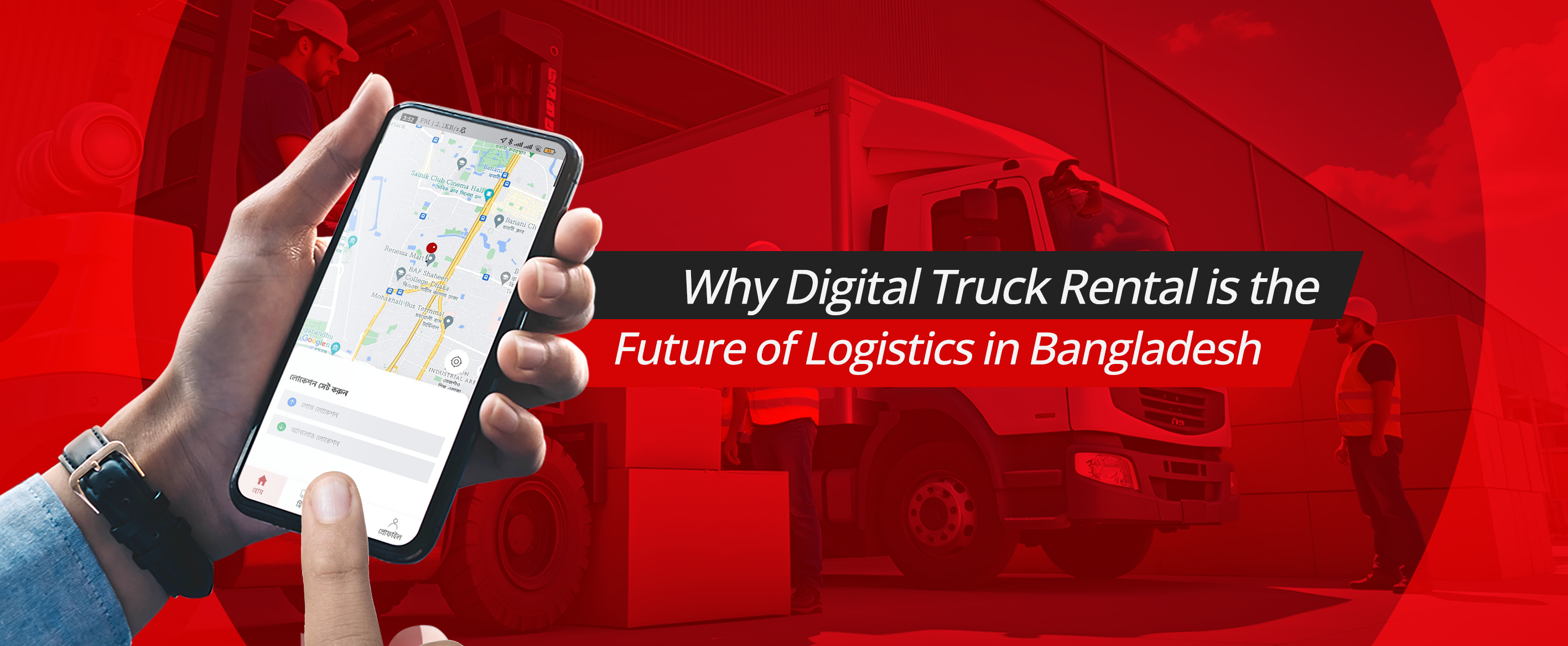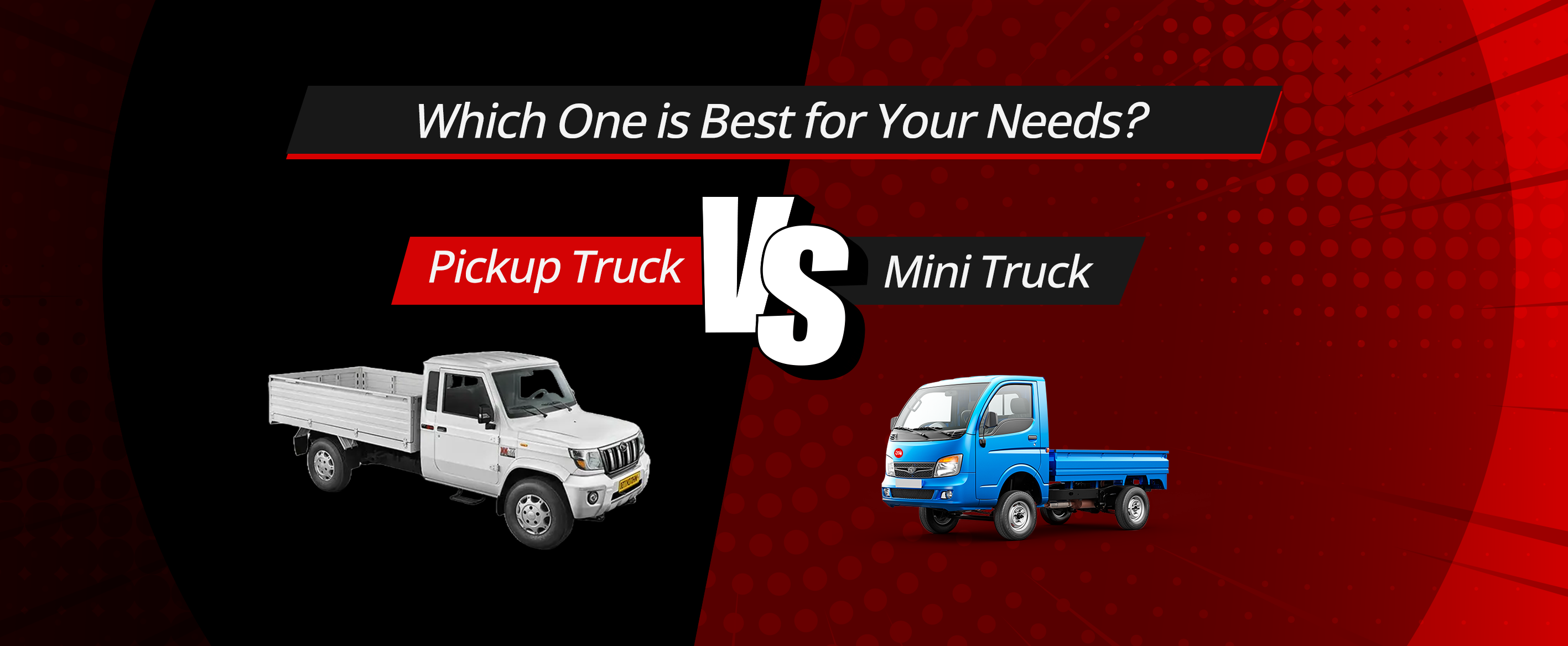
How Digital Truck Rentals Are Transforming Logistics in Bangladesh
- On April 06, 2025
In Bangladesh, the trucking logistics sector serves as the key engine of the economy, facilitating the seamless flow of goods nationwide. As businesses expand and e-commerce booms, the need for reliable and efficient transportation of trucks has dramatically increased. Traditionally, truck companies have struggled with inefficiencies, delays, and inflated costs due to manual processes and the involvement of numerous intermediaries. However, the ongoing digital transformation is reshaping the landscape of truck rental services, pushing them towards online platforms. These digital solutions offer streamlined operations, cost-effectiveness, and enhanced transparency for both businesses seeking transportation and truck owners providing it. For instance, platforms like the Truck Lagbe App are revolutionizing the industry by directly connecting customers with available trucks and drivers, ultimately simplifying and optimizing the entire trucking logistics process.
1. The Current State of Trucking Logistics in Bangladesh
The current landscape of trucking logistics in Bangladesh, while vital for the nation's economic activities like trade, agriculture, manufacturing, and the burgeoning e-commerce sector, faces significant hurdles. The industry is largely fragmented, characterized by inefficiencies and a strong adherence to traditional practices, which ultimately hinder the smooth movement of goods. For decades, businesses have navigated a complex and outdated system for arranging truck rentals and trucks, relying on a network of conventional truck companies, individual owners, and intermediaries. This contrasts sharply with developed economies, where digital platforms have revolutionized logistics. Key issues include:
- Pricing Volatility: Businesses frequently encounter inflated freight rates and unpredictable pricing due to the absence of standardized mechanisms.
- Middleman Reliance: The heavy dependence on brokers results in reduced earnings for truck owners and delays in transactions.
- Availability Challenges: Businesses often struggle to secure suitable trucks, leading to underutilized fleet capacity and delivery delays.
- Manual Processes: The prevalence of manual booking and paper-based documentation contributes to inefficiencies and uncertainty in delivery timelines.
These challenges highlight the urgent need for modernization within the trucking logistics sector to improve transparency, efficiency, and overall reliability for all stakeholders.
2. The Need for Digital Transformation in Trucking Logistics
Bangladesh's rapidly expanding economy necessitates a resilient, cost-effective, and efficient trucking logistics system. As e-commerce, manufacturing, and agriculture sectors flourish, businesses demand readily available trucks, transparent pricing, and streamlined logistics. Unfortunately, the traditional reliance on truck companies and manual processes is struggling to keep pace, resulting in inefficiencies and escalating costs. The solution lies in digital transformation. Introducing online truck rental platforms provides a smarter, more structured approach, leveraging technology to optimize truck booking, pricing, and fleet management. Key drivers propelling this digital shift include:
- Increased Demand for Speed: Businesses require faster, more reliable trucks and drivers to meet rising consumer expectations and support critical supply chains.
- E-commerce Growth: The surge in online shopping necessitates efficient last-mile delivery, which digital platforms facilitate through on-demand rentals and optimized load management.
- Transparent Pricing: Digital platforms offer fixed, transparent pricing, eliminating hidden costs and empowering businesses with better budget planning.
- Direct Connections: By connecting businesses directly with truck owners, digital platforms reduce costs and enhance service quality.
- Advanced Tracking: Real-time GPS tracking and route optimization improve delivery efficiency and security.
- Digital Documentation: Electronic invoicing and cashless transactions streamline payments and reduce paperwork.
These factors underscore the critical need for digital transformation to modernize Bangladesh's trucking logistics sector, ensuring it can support the nation's continued economic growth.
3. How Digital Truck Rental Works
In response to the growing need for efficient and transparent trucking logistics in Bangladesh, digital truck rental platforms are transforming the industry. Apps like Truck Lagbe offer a user-friendly, technology-driven solution for renting trucks on demand, eliminating the inefficiencies of traditional systems that rely on conventional truck companies. These platforms connect businesses and individual customers directly with truck owners and drivers through intuitive mobile and web applications, simplifying the process of booking, tracking, and paying for transportation without the need for middlemen.
Here's a breakdown of how these digital platforms streamline the truck rental process:
- Detailed Trip Input: Customers begin by specifying their transportation requirements, including precise pickup and drop-off locations, the type of goods being transported (e.g., construction materials, agricultural products), the preferred truck type and size (mini, medium, or heavy-duty), and the desired date and time for pickup.
- Real-Time Price and Availability Comparison: The platform instantly provides cost estimates based on distance, truck type, and market rates, along with a list of available trucks in the vicinity. Customers can compare prices, sizes, and estimated delivery times, and even view service ratings and reviews from previous users to make informed decisions.
- Instant, Negotiation-Free Booking: Unlike traditional methods that involve lengthy negotiations and paperwork, digital platforms enable instant booking with just a few taps. Users receive immediate confirmation and truck and driver details, ensuring timely deliveries and minimizing delays.
- Live Shipment Tracking: TL GPS tracker allows customers to monitor their shipments in real-time, providing accurate delivery estimates and enhancing security if drivers use it on their vehicles.
- Secure Digital Payments: Digital platforms offer various secure payment methods, such as mobile wallets, credit/debit cards, and bank transfers, eliminating the risks and inefficiencies associated with cash transactions. Truck owners receive prompt payments, and businesses receive automated invoices for easy expense management.
- Transparent Feedback: After each trip, customers can rate and review the truck and driver, providing a yes/no feedback that helps maintain service quality and accountability. This feedback system fosters a trust-based environment, encouraging truck owners to deliver excellent service.
4. Advantages of Digital Truck Rental for Businesses
For businesses across Bangladesh, efficient trucking logistics are critical for moving goods and supplies. However, traditional truck rental methods, often involving conventional truck companies, can be slow, costly, and unreliable. Digital truck rental platforms are revolutionizing this landscape by offering a streamlined, cost-effective, and dependable alternative. By cutting out intermediaries, optimizing routes, and providing data-driven insights, these platforms give businesses a significant competitive edge in managing their supply chains. Here's a breakdown of the key advantages:
- Reduced Costs: Businesses save money by connecting directly with truck owners, eliminating broker fees, comparing real-time prices, and optimizing fuel consumption through GPS-guided routes.
- Wider Truck Availability: Companies gain access to a diverse fleet of trucks, including specialized vehicles, and can find available trucks on demand, ensuring they always have the right vehicle for their needs.
- Faster and More Reliable Deliveries: Instant booking, optimized routes, and 24/7 availability minimize delays and ensure timely deliveries, improving customer satisfaction.
- Enhanced Transparency and Security: Real-time tracking, verified drivers, secure digital payments, and electronic documentation provide greater control and peace of mind.
- Data-Driven Insights: Analytics tools help businesses track expenses, analyze delivery patterns, optimize fleet utilization, and monitor driver performance, leading to smarter logistics management.
- Scalable Logistics: Businesses can easily scale up during peak seasons or expand to new locations without the burden of owning a dedicated truck fleet.
By leveraging these advantages, businesses can significantly improve their trucking logistics operations, reduce costs, and enhance their overall efficiency.
5. Benefits for Truck Owners and Drivers
The shift towards digital trucking logistics in Bangladesh isn't just beneficial for businesses; it's also a significant win for truck owners and drivers. Traditionally, they faced challenges like inconsistent work, reliance on middlemen, payment delays, and safety concerns. Digital truck rental platforms are changing this, creating a more profitable and secure environment for independent truck owners and those working for truck companies. Here’s how:
- Increased Job Opportunities and Income: Digital platforms connect drivers with a wider range of customers, reducing idle time and allowing them to choose trips that fit their schedules and earn fairer wages by eliminating middlemen.
- Reliable and Transparent Payments: Instant digital payments, standardized pricing, and detailed earnings reports ensure drivers are paid on time and fairly, eliminating the uncertainty of traditional payment methods.
- Better Fleet Utilization and Reduced Downtime: Truck owners can maximize their vehicle usage by finding return loads and optimizing fleet distribution, leading to increased revenue and sustainability.
- Enhanced Safety and Security: Verified customers, GPS tracking, and cashless transactions create a safer working environment, reducing risks associated with traditional trucking.
- Improved Work-Life Balance: Drivers gain more control over their schedules, choosing trips that suit their needs and avoiding unpaid waiting times, leading to a better work-life balance.
- Growth Opportunities for Independent Owners: Digital platforms level the playing field, allowing small-scale owners to compete with larger truck companies, build their brand, and expand their businesses.
6. Impact of Digital Truck Rental on Small and Medium Enterprises (SMEs)
Small and medium-sized enterprises (SMEs) are the lifeblood of Bangladesh’s economy, driving employment and growth. However, the high costs and inefficiencies of traditional trucking logistics pose a significant hurdle. Many SMEs struggle with transportation due to limited trucks, unpredictable pricing from conventional truck companies, and reliance on costly third-party providers. Digital truck rental platforms are revolutionizing this, offering SMEs affordable, flexible, and scalable logistics solutions. These platforms enable SMEs to access on-demand trucks and drivers, streamlining operations and boosting growth. Here's how:
- Affordable and Flexible Logistics: SMEs can avoid the high costs of owning and maintaining a fleet by renting trucks only when needed, choosing the right size truck for each job, and reducing fixed expenses.
- Scalability for Growth: As SMEs expand, they can quickly scale their logistics by renting more trucks without long-term commitments, upgrading vehicle types as needed, and reaching new markets.
- Improved Market Reach and Customer Satisfaction: Faster deliveries, competitive pricing, and expanded delivery networks help SMEs reach more customers and improve satisfaction.
- Greater Transparency and Control: Transparent pricing, real-time tracking, and direct communication with drivers give SMEs better control over their deliveries.
- Reduced Risk and Increased Reliability: Verified drivers, 24/7 truck availability, and secure payments minimize risks and ensure reliable transportation.
- Data-Driven Logistics Optimization: Analytics and reporting tools help SMEs track expenses, analyze delivery performance, and plan efficient routes, leading to cost savings and improved operations.
While the promise of digital trucking logistics is immense, the transition in Bangladesh’s transport industry isn't without its challenges. Many truck companies, independent truck owners, and drivers face hurdles moving from traditional methods to digital platforms. Addressing these obstacles is crucial to fully realizing the benefits of digital truck rental solutions. Here’s a look at the key challenges and potential solutions:
- Resistance to Technology: Many traditional operators are hesitant to adopt digital tools due to a lack of digital literacy, fear of losing control, and mistrust of online systems. User-friendly platforms, training programs, and awareness campaigns can help overcome this.
- High Initial Setup Costs: The cost of smartphones and data, along with the learning curve, can deter truck owners. Subsidized devices, affordable data plans, and incentives for early adoption can ease the financial burden.
- Internet and Connectivity Issues: Poor internet connectivity in rural areas hinders real-time tracking and communication. Offline app functionality, infrastructure improvements, and alternative communication channels are needed.
- Cybersecurity and Digital Payment Concerns: Fears of fraud and data theft make some operators wary of digital payments. Secure payment gateways, two-factor authentication, and educational campaigns can build trust.
- Competition from Established Brokers: Middlemen may resist digital adoption due to the threat it poses to their income. Fair pricing, regulatory support, and integrating brokers into the digital system can mitigate this.
- Government Regulations and Policy Challenges: A lack of clear regulations and tax policies can create uncertainty. Policy advocacy, simplified taxation, and legal awareness programs are necessary to align digital truck rental with government requirements.
Digital truck rental is no longer just an option—it is the future of trucking logistics in Bangladesh. By eliminating inefficiencies, reducing costs, and enhancing transparency, digital platforms are transforming the industry. Businesses can enjoy smoother logistics operations, while truck companies and drivers benefit from increased job opportunities and fairer pricing.
With platforms like Truck Lagbe App leading the way, Bangladesh is on the path to a more efficient and tech-driven logistics ecosystem. As the industry continues to evolve, embracing digital trucking logistics will be essential for economic growth and operational efficiency.
Categories
Recent Posts
- ENJOY UP TO TK1,250 DISCOUNT (4%) BY USING PROMO CODE: CARRY25
- ENJOY UP TO TK 1,500 DISCOUNT (4%) BY USING PROMO CODE: BIGMOVE25
- How Mr. Afzal Unlocked Great Profit With Truck Lagbe’s 18 Feet Truck Feature!
- How to Book a Shifting Service Using the Truck Lagbe App
- ENJOY 5% DISCOUNT (UP TO ৳500) BY USING PROMO CODE: DARUN25
Choosing Between a Pickup and a Mini Truck: Which one should you select?

ENJOY DISCOUNTS OF 6% (UP TO TK.1000) BY USING PROMO CODE: EIDI25


